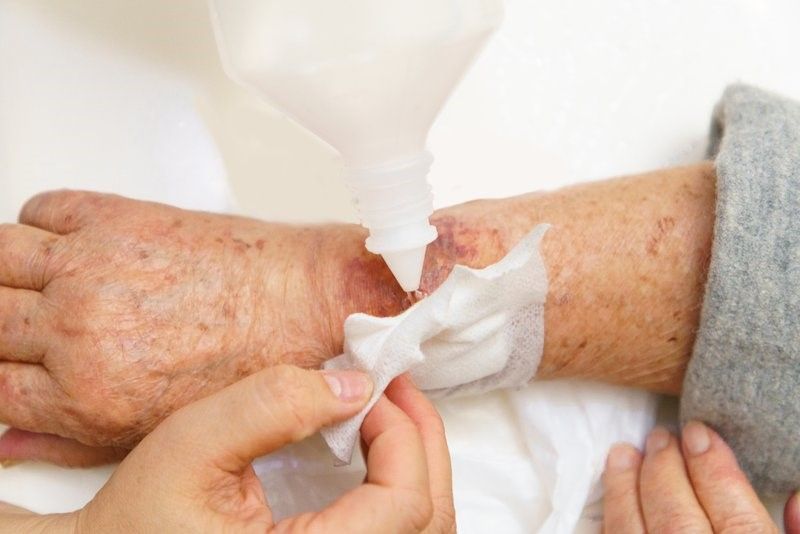A family owned business providing a full range of home health and school nursing services
Preventing Complications: Tips for Managing Diabetic Wounds in Seniors
Managing wounds with diabetes can be especially challenging for seniors, but proactive care can prevent serious complications and support a better quality of life. Diabetic wounds, often slow to heal, pose unique risks that require both attention to detail and consistent care. With the right approach and support, seniors can manage their wounds effectively, reducing the risk of infections, hospitalizations, and even amputations.
This article delves into the essential steps for managing diabetic wounds in seniors, highlighting the importance of both family and professional support.
Understanding the Challenges of Managing Wounds with Diabetes
Diabetic wounds are a significant concern for seniors, often developing due to reduced blood flow and slower healing rates. Limited mobility, cognitive decline, and access issues compound these challenges, making it more difficult for seniors to handle wound care independently.
Mobility challenges are a major barrier. Arthritis or balance issues can prevent seniors from easily reaching or dressing a wound. Likewise, cognitive decline, whether due to age-related memory loss or early signs of dementia, can make it difficult for seniors to remember when to change dressings or recognize signs of infection. This combination of physical and cognitive hurdles emphasizes the need for reliable support from family members and healthcare providers.

Risks of Neglecting Diabetic Wounds
When wounds related to diabetes are not managed properly, the consequences can be severe. Even minor wounds can become serious in a short period if not properly attended to, potentially leading to infections, hospitalizations, and, in extreme cases, amputations. Moreover, untreated infections can spread, putting a senior’s health at significant risk.
Key Strategies for Managing Diabetic Wounds in Seniors
Proper management of diabetic wounds in seniors includes regular cleaning, careful monitoring, and lifestyle adjustments that promote healing. Here are foundational steps that support better wound care outcomes.
Gentle Cleaning and Dressing
Regular cleaning is crucial to prevent infection, but it should be done with care. The skin of older people can be sensitive, so using mild soap and water is generally best. Avoid harsh disinfectants that might cause irritation or slow down the healing process. After cleaning, applying a dressing tailored to the wound type provides essential protection. It's important to replace dressings consistently, ideally daily or as recommended by a healthcare provider.
Consistent Monitoring for Infection
Keeping a close eye on diabetic wounds is essential, as early signs of infection can be subtle. Increased redness, swelling, warmth, or unusual discharge can signal infection and should prompt immediate consultation with a healthcare provider. By regularly checking for these signs, families and caregivers can catch potential issues before they worsen.
Maintaining Stable Blood Sugar Levels
High blood sugar impedes the body’s natural healing abilities, increasing infection risks. Seniors managing wounds with diabetes should prioritize blood sugar monitoring and adhere to any prescribed diabetes management plans. Consistency with medication, a balanced diet, and regular check-ups with a healthcare provider can make a significant difference in wound healing.
The Role of Family in Supporting Wound Care
For many seniors, family support plays an invaluable role in effective wound management. Family members can assist with both the practical and emotional aspects of diabetic wound care, offering a steady presence that reduces stress and builds confidence.
Family can assist with daily routines, helping seniors clean and dress wounds, and ensuring that they follow recommended care instructions. Emotional support is also essential, as managing chronic wounds can be emotionally demanding. Regular encouragement and open communication foster a positive outlook and make the experience less overwhelming. By actively participating in wound management, families contribute to a greater sense of independence and dignity for seniors.
Engaging Professional Help for Comprehensive Care
While family support is essential, professional healthcare services offer expertise that can make a crucial difference. Nurses and wound care specialists bring specialized skills that improve the healing process, from using advanced dressings to recommending personalized treatment plans.
CritiCare, for instance, provides professional guidance and ongoing assessments that are critical in effectively managing wounds related to diabetes. Regular visits from healthcare providers can ensure that the wound is healing as expected and that the senior is following the optimal care plan. The professional support also relieves some of the burdens on family members, allowing them to focus on providing emotional encouragement.
Education Empowers Seniors in Managing Wounds
Educating seniors on managing wounds related to diabetes empowers them to take a more active role in their health. Understanding the importance of proper wound care, recognizing the signs of infection, and knowing when to seek medical help are all crucial aspects of diabetic wound management.

CritiCare provides resources and support to educate both seniors and their families on diabetic care and wound management. Local healthcare organizations often offer seminars and workshops on diabetes and wound care that can provide valuable information. Additionally, informational pamphlets and online resources are readily available to guide seniors in managing wounds confidently and safely.
The Path to Better Health with Consistent Wound Care
Effective wound management is all about physical healing, preserving the quality of life, and promoting a sense of control and independence. By prioritizing proactive diabetic wound care, family members, healthcare providers, and seniors can work together to avoid complications and support a brighter, healthier future.
Diabetic wound care can feel daunting, but with the right support, the journey becomes manageable. CritiCare is here to help families and seniors navigate these challenges, providing the expertise and compassionate care needed to ensure optimal outcomes.
Take Action to Protect Your Loved One’s Health
With CritiCare’s Adult Home Nursing Services, seniors and their loved ones can access the guidance needed to take control of wound management and safeguard their health. With the right care, managing wounds with diabetes becomes more than just a routine but a step towards a healthier, more fulfilling life for our beloved seniors.
Empower your loved ones with the support and care they deserve. Contact CritiCare and take proactive steps to manage diabetic wounds effectively, giving your family peace of mind and the security of professional, compassionate care.

CONTACT INFORMATION
Chadds Ford PA 19317
info@criticareplus.com
Mon-Fri 9:00 AM - 5:00 PM, Sat-Sun - Closed
24 Hours on call services
OUR LOCATION
BROWSE
CONTACT INFORMATION
Chadds Ford PA 19317
info@criticareplus.com
Mon-Fri 9:00 AM - 5:00 PM, Sat-Sun - Closed
24 Hours on call services
OUR LOCATION










